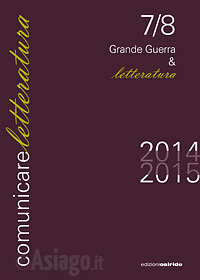Monday 4/1/2016 at 17:00
Books

Presentation of the book "the great war and literature. Communicating literature 7/8 "by Paola Maria Filippi, Asiago, January 4, 2016
Monday January 4, 2016 at 17.00 at the Council Chamber of Asiago, will present the new number 7/8 let Literature entitled "the great war and literature", edited by Paola Maria Filippi.
The meeting is an excellent opportunity to delve into one of the bloodiest periods in the history of the plateau, which is that of the first world war.
During the meeting, speakers include Alessandro Niero and Andrea Vollman.
GREAT WAR LITERATURE
The theme "great war" deals with ample spaces for months and months on all media in the whole of Europe and the testimonies and reflections related to conflict have multiplied exponentially. It seems hard to find still something not repetitive, go unexplored paths. Almost impossible to have
a comprehensive view of the issues and the studies that have followed. Also literature and poetry, which in conflict and conflict have originated, and in it they found its reason for being, continue to enjoy adequate attention and dissemination. And yet still much neglected exists, in particular in a transcultural and translinguistica.
The new issue of "communicating literature» (7/8), for Europe and for Italy, wants to present itself, though, not only as the umpteenth miscellany of texts certainly engaging and, each in his own way," unique ", in the usual fascinating blend of Primärliteratur and critical essays. The purpose behind this new release is to offer himself as gusset for a kind of "preparing" a great pool, where you can work on material unexplored, having second thoughts, read through different eyes.
Many contributions, the result of particular sensitivity and soft-skills, will prove so needed to be given to those who wish to attempt an incubator future truly European literary and poetic expression synthesis that the conflict has generated. And continues to generate, because it is important to stress how the great catastrophe, with thousands of stories handed down, has become in turn a "myth" and, as such, in continuation to rethought and reworked, proves to be productive of new works that seek not only to understand the aesthetic dimension and make it clear, but also of making tolerable the immeasurable.
According to the guidelines of "communicating literature" you are looked for evidence and you are stressed critical interventions by the Italian area and South-Eastern Europe, with particular attention to the Danube-Austrian space in which the conflict has generated. The materials presented in this issue are of great variety and richness. Canonical names – Clemente Rebora, Marinetti, Ungaretti, D'Annunzio, pastures, Kraus, Hofmannsthal, Trakl, Jünger, Thomas Mann, Bertha von Suttner, Franz Werfel, Alexandr Blok and Mayakovsky – not to mention that some are bound to other totally "unpublished", at least for the Italian Player, were unknown and ignored despite the witness and poetic force that their writings preserved: Alexander Sacher-Masoch, Gustav Heinse, Ludwig Stein, Károly Pap , Frantis ¡ ek Halas, Franz Janowitz, Nikolai Gumilev.
These contemporary reworking dialogue with incisiveness and strength with interpretations and contemporary proposals of great Urkatastrophe. Emblematic the case Kraus, who with his endless drama suggests exploring paths of great emotional impact and searing topicality as well as "inventions" of Gnedt and Markovic, with angles and different accents continue to repeat this first great war you need to mention the others, later, that never would have wanted to tell. Particular the operation of Jackets that through subsequent manipulations also retrieves the private agreement of a war diary anonymous art, by giving him a supratemporal dimension and therefore very current.
In this issue, therefore, the critical interpretations is interspersed with lyrics, historical productions take place in contemporary inventions, the lyrical prose, theater, aphoristically: common denominator, however, always the word, a word that was retrieved from a purely denotative, functional, a word that not only wants to communicate an experience, albeit exceptional, extra-ordinary. In his personal poetic connotation this word want to seize and return the essence, the universal of what seemed not to be expressed in its awfulness. The physical proximity, on paper, of many similar expressions and never the same, recreating the polyphony of sounds "war", makes it possible to grasp the General, shared, that the ' plurivocality ' sometimes obscure. One gets the impression that nationalism that both played in the outbreak of the first world war and then in the resolutions that following this were taken, have influenced the history of literary and artistic expressions that were also imprisoned within the borders pretty close to every single language and every single literature. You would want every author and every scholar, with his own creative contribution and critical reflection, succeed, in reading, to overcome the barriers of national reflection, in the spirit of truest poetry that reveals even stronger when universal its potential complaint.
All rights reserved.